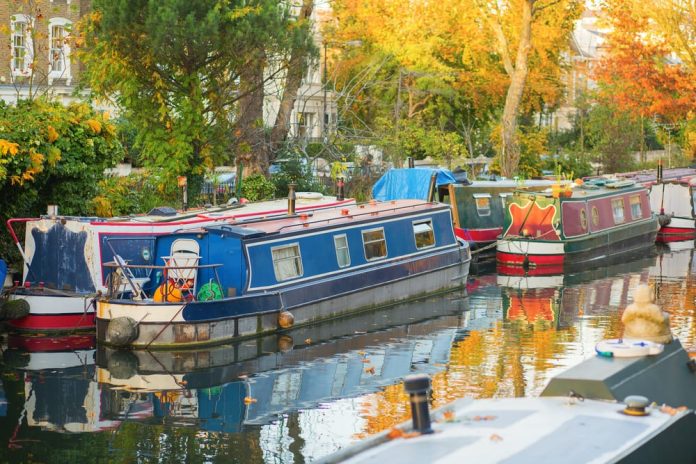There has been a sharp increase in the number people living in houseboats in the United Kingdom. Cost is the main driver. As the cost of housing becomes out of reach for a growing number of young people, life on the water has become an affordable and exciting alternative.
Not so simple. Winters are harsh, and emptying a septic tank is no easy task. But the frugality and freedom of living on a houseboat goes well with an entrepreneurial mindset. Richard Branson’s first home was a houseboat and he lived in it for many years until his business empire took off.
However, used houseboats are not always perfect and can have issues. Therefore, it is more important than ever that you take your time, carefully check and consider every prospect. There is a romantic element to the idea of living on a houseboat, but don’t let yourself fall in love with a beautiful boat until you have fully considered these six vital aspects:
1. Budgeting and financing
You will need to shop around. Prices for used houseboats vary widely.
Houseboat prices can range from £10,000 to £200,000 depending on the level of utilities such as a wood burning stove, chemical toilet and electrical wiring. Each houseboat owner must pay for a boat license, which can range from £500 to £1,000 per year. The size of the houseboat also needs to be considered, especially the width. If you pay for a berth, the width of the houseboat will affect the rental price. While docking prices can be high, companies often provide you with electricity and a toilet. Some boats even come with a permanent berth at no extra charge.
Permanent parking is more expensive, so frugal houseboat dwellers usually prefer to save money by constantly traveling. The norm is to moor in one place for a maximum of 14 days before moving on, although they usually moor for the winter (November to March). If you are a regular traveler, you will need to clearly state where you are allowed to moor. There are many restrictions on rivers, but fewer on city canals.
There are restrictions on the minimum distance between moorings and returning to a previous mooring, which can be a problem to overcome if you are trying to keep your job and life in the same city. If you don’t plan on living on your houseboat this isn’t that much of a problem, there are many residential mooring companies that will let you rent a dock if you don’t live on a boat.
Houseboat buyers will not be able to get a mortgage because there is no land to back it. Funding is usually provided through personal loans or specialized lenders. There are financial companies that specialize in boat loans and these experts can tailor your financial packages to suit your lifestyle needs.
Typically, boat loans carry a higher interest rate than housing loans, ranging from 6% to 15%, and a 20% deposit is not uncommon. If you can buy your houseboat right away, then it is a wise financial decision.
You can also buy a boat to turn it into a houseboat. It is worth paying attention to partial conversions, when the owner gave up, but made a good start. While these boats require additional time, energy, and funding, they are generally less expensive than pre-built houseboats.
2. Examine the frame of the houseboat.
The houseboat you want to buy has probably already been on the water. But houseboat structures are prone to damage, including deep scratches or even holes. So make sure you do a thorough physical examination. Also inspect the interior for damage. Whenever you buy a used houseboat, be sure to go and see the houseboat. While photographs are helpful, they can often hide any flaws in the houseboat. By going there in person, you can be sure that the houseboat meets your standards. If possible, get an expert opinion.
3. Check the electronics
Just like cars, houseboats are equipped with a range of electronic sensors that tell you when something is wrong with the houseboat. This electronics will also help provide important information such as speed and throttle readings. These electronic systems can cost a lot of money to repair if they are broken. Make sure you don’t buy a houseboat with a broken electronic system as you will have to fix it later and spend even more money.
4. Start the engine
A houseboat doesn’t look much like a houseboat if it can’t move. Take a look at the engine and see if there are any issues or issues with it. Talk to the owner and ask him to start the engine. If the owner refuses to do so, there is usually something they want to hide. Engines can be even more expensive to repair or replace than an electronic system, so make sure you get the information behind it.
5. Check the inside of the houseboat
Houseboat interiors are subject to a lot of wear and tear and can be badly damaged if left unmaintained. A large amount of mold and mildew can form inside a houseboat, which can cause a lot of trouble. If left undiscovered, this mold can make you very sick and, in severe cases, even kill you. If there is a large amount of mold, you may want to look elsewhere for a houseboat. houseboat ownership with mold outweighs the benefits.
6. Know the history of the houseboat
Just like a car, a houseboat has its own stories and histories that the owner will know about. As you search for your perfect water home, pay close attention to any signs of possible engine problems or the need to replace any items on the houseboat. It’s also important to know what parts are and aren’t available, as this will affect the houseboat’s repair processes if she needs them. If you are making such a large purchase, make sure you see the big picture.










